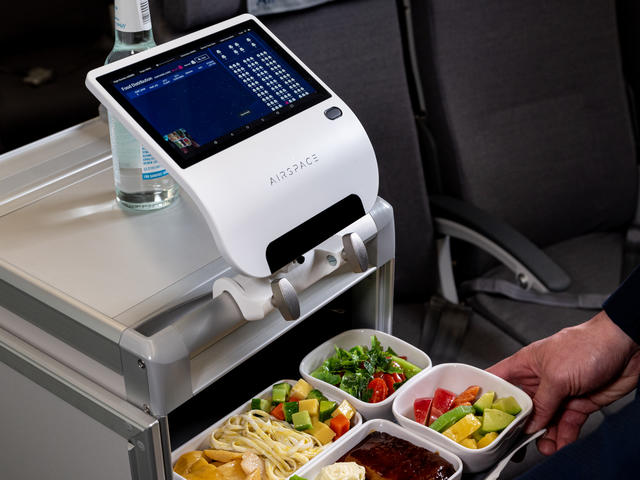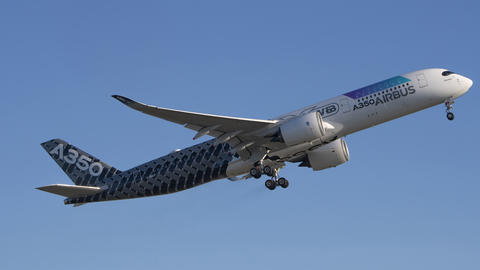How can more precise tracking of in-flight catering – from meal and beverage service to the collection and disposal of waste – lead to more sustainable air travel?
Airbus’ highly innovative digital solution to this challenge includes the automatic capture of data for passengers' onboard meal consumption, along with tracing the amount of unused food and drinks that remain. By integrating such information in an artificial intelligence-driven system, airlines could optimise their catering services and better manage the after-meal disposal – leading to a potential for double-digit reductions in their CO2 emissions through weight reductions and fuel savings.
Elements of this solution have undergone initial evaluations in realistic conditions aboard the Airspace Explorer – a dedicated cross-programme flight test platform that Airbus utilises to test and demonstrate new innovations for future aircraft cabins.
The volume of airline cabin waste is expected to double by 2030
“The numbers speak for themselves: an estimated 1.43 kilograms of cabin waste is generated by each passenger per flight, of which more than 20 percent is represented by untouched food and drinks,” explained Michael Bauer, an Airbus Cabin and Cargo Architect. “The situation becomes more critical with the prediction that overall airline cabin waste – which totalled 6.1 million tonnes in in 2018 – is expected to double by 2030.” Source IATA survey issued in 2021.
IATA survey issued in 2021Key to Airbus’ solution for the tracking and controlling of in-flight catering is the Food Scanner, an artificial intelligence-enabled device that analyses the composition of food in a simple point-and-shoot process. It uses the same principle as scanners that are increasingly available in supermarkets today.
The Food Scanner’s downward-looking camera identifies what is on the meal tray as the cabin attendant pulls it out from the trolley during the in-flight service, and subsequently captures pictures of what remains when the tray is returned. A horizontally-oriented barcode scanner tracks the beverage bottles and cans that typically are placed atop the trolly.
Optimising data from the Food Scanner’s utilisation
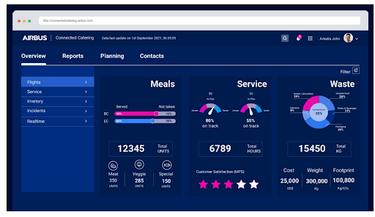
A cloud-hosted dashboard would use trends and statistics for catering prediction and planning to minimise waste.
Data from the Food Scanner can be processed via a separate, off-board cloud-hosted dashboard that generates KPIs (key performance indicators), using trends and statistics to enable highly accurate catering planning and the prediction of food/beverage consumption. This can be further optimised with a pre-flight meal ordering system made available for passengers – which already is being used by a growing number of airlines, particularly for their premium travellers.
The advantages of Airbus’ in-flight catering tracking solution are numerous. In addition to reducing the amount of food and beverages carried during flight – with the associated lower aircraft weight and reduction in fuel burned – the Airbus solution holds the promise of better management over the amount of food produced at the origin, along with the reduction in dedicated catering space aboard the aircraft, as well as enhancing the waste collection and separation process. Additionally, it would limit the amount of food and beverages that are discarded upon arrival – with certain countries requiring such waste to be burned.
The Food Scanner goes airborne on Airbus’ Airspace Explorer aircraft
The Food Scanner was demonstrated aboard Airbus’ Airspace Explorer aircraft during a recent South Asian demo tour.
“The first feedback from airlines and their cabin crews was positive,” said Sascha Thoerner, the Airspace Explorer Programme Architect at Airbus. “Demonstrating the Food Scanner in such a realistic environment with end-to-end connectivity is an important step toward maturing this system. Airbus would then be able to work with potential partners – including the airlines, caterers, and system manufacturers – for in-service trials, followed by eventual production.”
Airbus’ Airspace Explorer is taking advantage of a specially configured A350-900 flight test aircraft fitted with an award-winning Airspace cabin to test and showcase a number of customer-centric innovations. These innovations are focused on passenger experience, digitalisation, onboard health and sustainability.
Latest news
Continue Reading
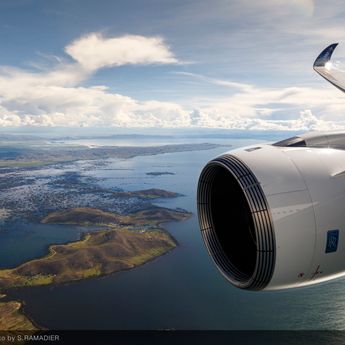
Web Story Safety
Flight control system: more redundancy to enhance resilience
More redundancy to enhance resilience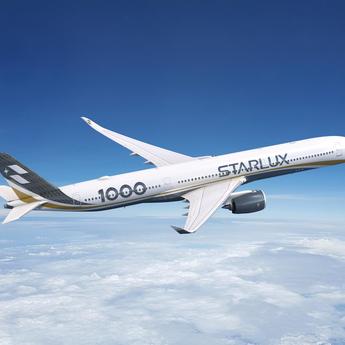
Press Release Commercial Aircraft
STARLUX orders 10 more Airbus A350-1000s
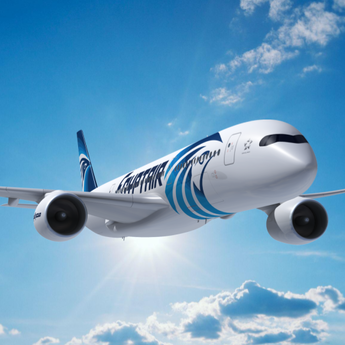
Press Release Commercial Aircraft
EGYPTAIR discloses order for an additional 6 Airbus A350 aircraft
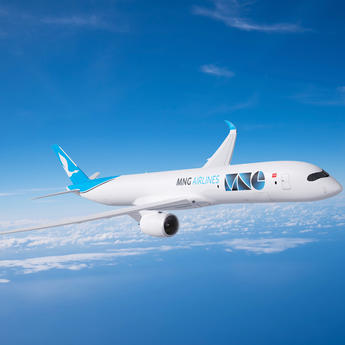
Press Release Commercial Aircraft
MNG Airlines to order two Airbus A350F Freighters
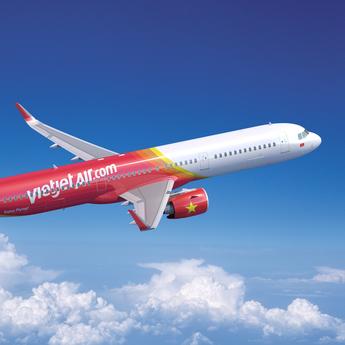
Press Release Commercial Aircraft
Vietjet to order 100 Airbus A321neo aircraft
